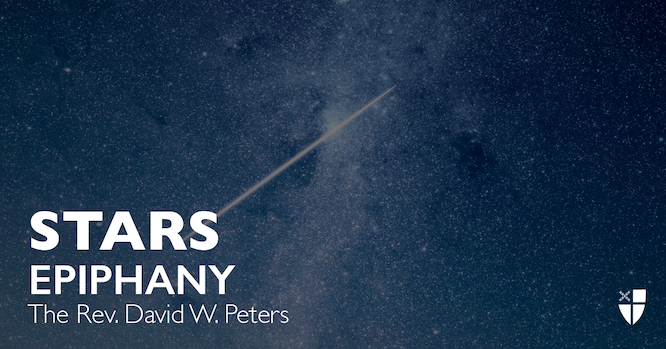Stars, Feast of the Epiphany – 2019
January 07, 2019

Long before telescopes and computers, people named the stars and charted their long journeys through the heavens. These early stargazers noticed patterns and consistency in their movements. Perhaps we can imagine they felt the stars were part of a greater story, and that the stars had the power to influence events on earth.
Early books of the Bible testify to the power of stars in the life of ancient people. Job mentions three constellations: the Bear, Pleiades, and Orion. Childless Abram goes out at night and hears a promise from God that he will have many children, as numerous as the stars. Stars are said to “Sing together” and “shout for joy” in the Book of Job, and Psalm 147 tells us God names all the stars and determines their number. Clearly, the stars held meaning for the ancient people of God.
In our Gospel reading, we see wise men coming from the east, following a star. It is not clear to a modern reader how they knew this rising star announced the birth of “the king of the Jews,” as the connection between the rising star and the birth of a king is shrouded in mystery. What is even more strange, perhaps, is how everyone in the story—especially Herod—just rolls with it, accepting the wise men’s account of the star and the birth of the king. In fact, King Herod takes the wise men’s astronomical report so seriously that he drops everything to search for and eliminate the baby.
There are dozens of theories on where the wise men originated and how they knew so much about stars; the Greek word used in Matthew’s gospel is Magi, a group of learned scholars who advised kings by interpreting dreams and astrology. While much about the wise men is unclear, what is clear is that these men are not Judeans, but Gentiles. They are bearing witness to a cosmic event of astronomical proportions: the birth of a baby—though nobody seems to know exactly where he is.
We can imagine their shock when they discover that Herod is clueless about where this baby was located. Surely, King Herod would know if a king were born in his kingdom. It is in this detail that we can see how foreign these wise men are; they are seemingly naïve, unaware of the dangerous politics of Judea and unaware of how different this new king will be from other kings. They are simply seeking the king whom the star announced.
They follow the star until it stops over the place where Jesus was. It’s so simple. While it may seem mysterious and strange to us to follow a star this way, it is not strange for them. It is simply how they understand the world. It is simply how they found Jesus.
We must be open to the many ways people find Jesus, especially the ways that people different from us find Jesus. The Feast of the Epiphany commemorates the manifestation of Jesus to the peoples of the earth. Just as every human culture is unique and different, the ways in which different cultures find and understand Jesus will be different, too. We cannot predict or assume how the diverse cultures within our own communities will find Jesus. We must be open to all the ways the Spirit leads people to our Savior, Jesus Christ.
The vision John sees in his Revelation contains all the diversity of the human species: “And there was a great multitude that no one could count, from every nation, from all tribes and peoples and languages, standing before the throne and before the Lamb, robed in white, with palm branches in their hands.” They are all worshipping Jesus, celebrating the new life they have found in him. Like the wise men who watched the star stop over Jesus and were overwhelmed with joy, the people in John’s vision are overwhelmed with joy in the presence of God.
Today, we are a community of people from many different backgrounds and places, gathered in the presence of Jesus. This itself is a miracle. This means that there is hope for a better world. This means the good news that Jesus died and rose again is a story for everyone, no matter how far they have come to find him. So, rejoice today that the wise men followed the star and found Jesus. Rejoice today because we found him, too.
¡No olvide suscribirse al podcast Sermons That Work para escuchar este sermón y más en su aplicación de podcasting favorita! Las grabaciones se publican el jueves antes de cada fecha litúrgica.


